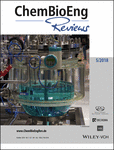
ChemBioEng Reviews
Scope & Guideline
Unveiling Breakthroughs in Process Chemistry
Introduction
Aims and Scopes
- Sustainable Chemical Processes:
The journal emphasizes the development and optimization of sustainable chemical processes, including green chemistry and waste valorization, to minimize environmental impact and enhance resource efficiency. - Biotechnology Applications:
Research related to biotechnological applications in chemical engineering is a core focus, including microbial processes, enzyme catalysis, and biorefinery techniques that leverage biological systems for chemical production. - Nanotechnology and Materials Science:
The journal explores advancements in nanotechnology, particularly in the synthesis and application of nanomaterials for various purposes, such as catalysis, drug delivery, and environmental remediation. - Energy Production and Storage:
Research on energy generation, particularly from renewable sources, and the development of efficient energy storage systems is a significant area of interest, highlighting innovations in biofuels and battery technologies. - Water Treatment and Environmental Remediation:
The journal publishes studies on advanced techniques for wastewater treatment and environmental remediation, focusing on innovative materials and processes to address pollution and resource recovery.
Trending and Emerging
- Biomass Valorization and Biorefinery Technologies:
There is a growing emphasis on the valorization of biomass and the development of biorefinery technologies, showcasing the potential of waste materials as feedstocks for sustainable chemical production. - Advanced Nanomaterials and Their Applications:
Research on advanced nanomaterials, particularly in environmental applications and drug delivery systems, is on the rise, indicating a robust interest in leveraging nanotechnology for innovative solutions. - Life Cycle Assessment and Sustainable Practices:
Increasingly, studies are incorporating life cycle assessment methodologies to evaluate the sustainability of processes, products, and technologies, aligning with the global shift towards sustainability. - Machine Learning and AI in Chemical Processes:
The integration of machine learning and artificial intelligence in optimizing chemical processes and predictive modeling is emerging as a significant trend, reflecting the industry's move towards data-driven approaches. - Electrochemical Technologies for Energy and Waste Treatment:
Research on electrochemical technologies for energy generation, storage, and wastewater treatment is gaining momentum, highlighting their potential for sustainable development and pollution mitigation.
Declining or Waning
- Traditional Chemical Processes:
There is a noticeable decline in papers focused solely on traditional chemical engineering processes, such as classical separation techniques and conventional catalysis, as the field increasingly embraces innovative and sustainable approaches. - Conventional Waste Management Techniques:
Research emphasizing outdated waste management practices is becoming less frequent, as newer strategies focusing on waste-to-energy conversion and resource recovery gain traction. - Single-Use and Non-Sustainable Materials:
The journal appears to be moving away from topics related to single-use plastics and non-sustainable materials, reflecting a broader trend towards sustainability and circular economy principles.
Similar Journals
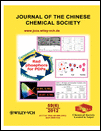
JOURNAL OF THE CHINESE CHEMICAL SOCIETY
Illuminating the Path of Chemical InnovationJOURNAL OF THE CHINESE CHEMICAL SOCIETY, published by WILEY-V C H VERLAG GMBH, is a vital resource in the field of chemistry, focusing on a broad array of topics pertinent to general chemistry and its advancing sub-disciplines. Established in 1954 and running through 2024, this journal serves as a significant platform for the dissemination of high-quality research, showcasing innovative findings and developments within the chemical sciences. With its Q3 category ranking and positioning at Rank #203 in General Chemistry per Scopus, it reflects the journal's commitment to research excellence and impact. While not an open-access publication, it ensures accessibility to a global audience, making it an essential tool for researchers, professionals, and students alike seeking to stay informed and engaged in the evolving landscape of chemistry.
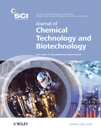
JOURNAL OF CHEMICAL TECHNOLOGY AND BIOTECHNOLOGY
Innovating Sustainable Solutions for Tomorrow's ChallengesJOURNAL OF CHEMICAL TECHNOLOGY AND BIOTECHNOLOGY, published by WILEY in the United Kingdom, serves as a premier platform for research at the interface of chemical engineering and biotechnology. With an ISSN of 0268-2575 and E-ISSN 1097-4660, this journal has established itself as a crucial resource for scholars and professionals, evidenced by its impactful categorization in the Q1 and Q2 quartiles across multiple domains such as Inorganic Chemistry, Biotechnology, and Renewable Energy. The journal encompasses a broad scope that includes innovative research on sustainable technologies, pollution management, and advances in chemical syntheses, making it essential for those pursuing cutting-edge developments in these disciplines. Researchers and practitioners benefit from its comprehensive coverage, as it includes insightful articles, reviews, and case studies that collectively push the boundaries of contemporary science and engineering. With a ranking of Q2 in its various categories and significant percentiles in key fields, the journal stands as a beacon for high-quality scholarship, eligible for impact in both academia and industry.
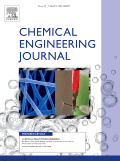
Chemical Engineering Journal
Empowering researchers with cutting-edge insights and discoveries.The Chemical Engineering Journal, published by Elsevier Science SA, stands as a premier platform for groundbreaking research in the multidisciplinary fields of chemical engineering, chemistry, and environmental science. With an impressive impact factor and ranking in the Q1 category across multiple categories such as Chemical Engineering, Chemistry, and Environmental Chemistry for 2023, this journal not only leads in publishing high-quality research but also emphasizes the latest advancements and innovative solutions in these critical areas. Researchers and professionals benefit from the rigorous peer-review process and can access a wealth of knowledge through the journal’s extensive archive, which has been a staple in academia since 1975. The Chemical Engineering Journal is vital for anyone aiming to advance their understanding of complex chemical processes, engineering applications, and environmental impacts, making it an essential resource for students, academics, and industry experts alike.

Chemical Methodologies
Connecting Scholars to Transform Chemical KnowledgeWelcome to Chemical Methodologies, a premier journal published by SAMI PUBLISHING CO-SPC, dedicated to advancing the field of chemistry through innovative research and methodologies. With an ISSN of 2645-7776 and an E-ISSN of 2588-4344, this journal provides a vital platform for researchers and scholars to share their findings in areas encompassing physical, theoretical, and organic chemistry. Despite its initial HIndex and quartile rankings still being established, the journal's evolving impact within the academic landscape is underscored by its Scopus Ranks, which place it in the 35th percentile for physical and theoretical chemistry and the 33rd percentile for organic chemistry. Since its inception in 2022, and continuing through 2024, Chemical Methodologies aims to foster collaboration and knowledge dissemination among academics and practitioners alike, bridging theoretical concepts and practical applications. This open-access platform enhances accessibility for researchers and students worldwide, ensuring that groundbreaking contributions to chemical science reach a broad audience.

RUSSIAN JOURNAL OF APPLIED CHEMISTRY
Unveiling Trends and Challenges in Applied ChemistryRUSSIAN JOURNAL OF APPLIED CHEMISTRY, published by PLEIADES PUBLISHING INC, serves as a pivotal platform for advancing knowledge in the fields of chemical engineering and general chemistry. With an ISSN of 1070-4272 and an E-ISSN of 1608-3296, this journal has been in continuous publication since 1995 and is set to continue until 2024. Although it operates without an open access model, researchers can access a wealth of innovative research findings, critical reviews, and insightful discussions that reflect the current trends and challenges in applied chemistry. Its rankings place it in Q3 quartiles for both Chemical Engineering and Chemistry as of 2023, indicating its emerging influence within these disciplines. The Scopus rankings further highlight its relevance, positioning it in the lower percentiles, suggesting a fertile ground for researchers aiming to elevate the field. Engaging with this journal can enrich academic and professional understanding, making it an essential resource for anyone dedicated to furthering their expertise in applied chemistry.

Reactions is a dynamic open-access journal published by MDPI, dedicated to the advancement of research in the fields of Chemical Engineering and Chemistry. Launched in 2020, the journal aims to provide a platform for scientists and researchers to share their findings and innovations, facilitating the synthesis and dissemination of knowledge within the global academic community. With an impact factor that reflects its growing influence, Reactions ranks 47th in the Chemical Engineering category and 72nd in Chemistry on Scopus, placing it within the vibrant landscape of contemporary chemical research. Housed in the picturesque city of Basel, Switzerland, the journal is committed to open access, ensuring that its high-quality content is readily available to all. This commitment not only enhances visibility but also fosters collaboration among researchers, professionals, and students striving to push the boundaries of chemical sciences. As we look towards 2024 and beyond, Reactions continues to encourage submissions that explore groundbreaking methodologies, innovative applications, and transformative theoretical frameworks in chemistry and chemical engineering.

JACS Au
Driving discovery in analytical and theoretical chemistry.JACS Au, published by the American Chemical Society, is a premier open access journal dedicated to advancing research in the rapidly evolving fields of analytical chemistry, organic chemistry, and theoretical chemistry. Since its inception in 2021, JACS Au has quickly established itself as a leading platform for high-quality research, reflected in its Q1 rankings across multiple categories for 2023, including Organic Chemistry and Analytical Chemistry. The journal focuses on innovative methodologies and applications that drive the discipline forward, making it an essential resource for researchers, professionals, and students alike. With an impressive Scopus ranking, consistently placing in the top tiers of its categories, and offering a broad range of access options for its readership, JACS Au aims to foster collaboration and disseminate transformative ideas that impact the global scientific community. Exploring diverse topics within chemistry, this journal provides a vital conduit for sharing groundbreaking research and enhancing scientific dialogue.
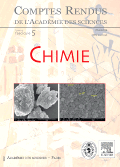
COMPTES RENDUS CHIMIE
Empowering Scientists with Open Access to Essential Knowledge.COMPTES RENDUS CHIMIE, published by the prestigious Académie des Sciences in France, stands as a significant journal in the fields of chemistry and chemical engineering. With an ISSN of 1631-0748 and an E-ISSN of 1878-1543, this open-access journal has been committed to disseminating high-quality research since its transition to open access in 2020. Featuring a diverse array of studies, the journal covers innovative research trends and applications, while maintaining a Q3 category ranking in both Chemical Engineering (miscellaneous) and Chemistry (miscellaneous) as of 2023. Its Scopus rankings, positioning at #251 out of 408 in general chemistry and #169 out of 273 in general chemical engineering, highlight its growing impact within the scientific community. Authored by a global cohort of scientists and researchers, COMPTES RENDUS CHIMIE is dedicated to the advancement of knowledge and sharing insights that are vital for ongoing research and development in the chemical sciences. Located in the heart of Paris at 23 Quai de Conti, 75006, France, the journal is an essential resource for those passionate about chemistry and engineering disciplines, fostering collaboration and innovation across the world.

ENVIRONMENTAL ENGINEERING SCIENCE
Catalyzing change through cutting-edge environmental research.ENVIRONMENTAL ENGINEERING SCIENCE is a leading journal published by MARY ANN LIEBERT, INC that provides a platform for pioneering research in the fields of environmental chemistry, pollution control, and waste management. With an ISSN of 1092-8758 and an E-ISSN of 1557-9018, this peer-reviewed journal aims to disseminate high-quality scientific studies that address critical environmental challenges. As evidenced by its 2023 category quartile rankings, it holds a notable position at Q3 in Environmental Chemistry and Pollution and Q2 in Waste Management and Disposal, highlighting its relevance and impact in these domains. Spanning over two decades from 1997 to 2024, the journal is dedicated to fostering innovations and promoting rigorous scholarship that can contribute significantly to sustainable environmental practices globally. Authors and researchers are encouraged to engage with this essential resource, which offers Open Access options to enhance the visibility and reach of their work. For those interested in advancing their understanding and practice within the environmental sciences, ENVIRONMENTAL ENGINEERING SCIENCE is an indispensable journal to consider.
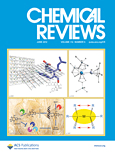
CHEMICAL REVIEWS
Transforming Chemical Research into Knowledge.Chemical Reviews, published by the American Chemical Society, is a leading journal in the field of chemistry, renowned for its comprehensive and authoritative reviews on a wide range of chemical topics. With its ISSN 0009-2665 and E-ISSN 1520-6890, this prestigious journal has maintained a remarkable trajectory since its inception in 1924, continuously contributing to advancements in the chemical sciences. As a Q1 journal in the Chemistry (miscellaneous) category, it stands at the forefront of research, boasting an impressive Scopus rank of #1 out of 408 in the field of General Chemistry, positioning it within the top 1% of the field. Chemical Reviews offers invaluable insights and serves as a critical resource for researchers, professionals, and students alike, facilitating knowledge exchange and fostering innovation in chemistry. While currently not open access, it remains a vital component of the scientific community, gathering an extensive readership base eager for the latest developments, methodologies, and theoretical frameworks in this dynamic discipline.